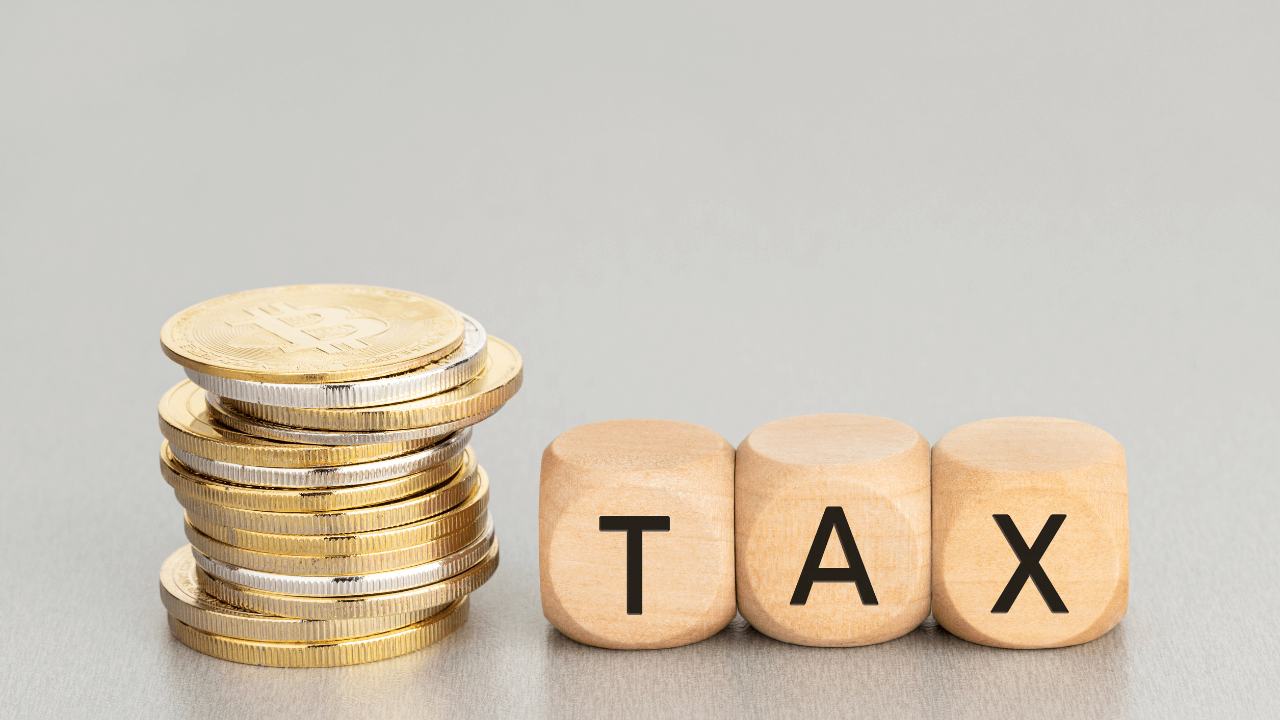Language:
Guide to Reporting Crypto on Taxes

Cryptocurrency like Bitcoin has taken the world by storm. Despite witnessing tremendous highs and lows, it is still one of the most popular investment options since it allows you to diversify your portfolio, get a better yield, and protect you from market ups and downs. I
nvesting in cryptocurrency is the same as investing in stocks. You can buy, sell, or trade cryptocurrencies on online exchanges or marketplaces.
Since it’s decentralized, banks, traditional financial institutions, or other central authorities, such as governments, are not involved. However, this does not mean you won’t have to pay taxes on your crypto gains and transactions. Navigating tax obligations is challenging on its own, but with crypto involved, even the most seasoned investors can end up scratching their heads.
We want to demystify this process and provide a comprehensive guide on reporting crypto on your taxes. Say goodbye to confusion and hello to clarity as we break down everything you need to know in simple, easy-to-understand terms.
Let’s dive in and get your finances in order once and for all!
Cryptocurrency and Tax Obligations

Cryptocurrency, or crypto, is a digital currency built on blockchain technology for secure and decentralized transactions. Unlike traditional currencies, it is not regulated by any central authority. Instead, each transaction is recorded on a blockchain public ledger for transparency and immutability. This means it is not owned or controlled by any single entity or organization.
Instead, they rely on a network of users who collectively verify and validate transactions through a process known as mining. Therefore, cryptocurrencies often have significant price fluctuations, which present opportunities for potential gains but also carry risks for investors.
However, they are subject to taxation just like any other investment asset.
While it’s a decentralized digital currency, the Internal Revenue Service (IRS) treats it like property, meaning you must report your gains and losses in crypto transactions in your taxes. In essence, any interaction with crypto assets, including buying, selling, trading, or even using them to purchase goods or services, must be accounted for when filing your taxes.
It’s also important to note that not all crypto transactions will have tax filing requirements in the US. The IRS has determined which activities are taxable and which ones aren’t.
For example, purchasing cryptocurrencies with fiat money does not trigger a taxable event as it is merely an exchange between two assets without any profit or loss realized.
Taxable Events in Cryptocurrency
One of cryptocurrency’s most common taxable events is selling your digital assets for fiat currency (e.g., USD). It’s kinda similar to reporting eBay sales on taxes, as you must report any gains or losses from selling crypto.
You can calculate the gain or loss amount by taking the difference between the cryptocurrency’s fair market value at the time of sale and its cost basis (the original purchase price). If you have held onto your cryptocurrency for over a year before selling, you’ll be eligible for a lower tax rate since it will be considered a long-term capital gain.
Another taxable event occurs when using cryptocurrencies to make purchases. While this may not seem like a significant transaction, technically, you are still disposing of your digital asset and must report any gains or losses on your taxes.
Staking and mining cryptocurrencies can also trigger taxable events. Staking refers to holding onto your digital assets to authenticate transactions on the blockchain network for rewards.
Similarly, profits from mining cryptocurrencies (i.e., using high-powered computers to solve complex mathematical problems to earn new coins) must also be reported as taxable income.
In addition to these taxable events, it is essential to note that even exchanging one cryptocurrency for another is considered a taxable event. If you trade Bitcoin for Ethereum, you must report any gains or losses on your tax return.
Overview of Tax Regulations for Cryptos
The first step in navigating crypto taxes is understanding the tax laws and regulations specific to your country. The United States and Canada consider cryptocurrency property and not currency.
Therefore, profits from trading or using cryptocurrencies are subject to capital gains tax. However, holding your crypto as business assets can make you eligible for write-offs as businesses are taxed differently.
In Canada, there is an exception for individuals who use their crypto as a form of payment instead of holding it as an investment—they will only be taxed on the difference between what they paid for the goods or services and what they received in return.
The UK treats cryptocurrencies differently depending on how they are acquired and used. If you receive crypto as payment for goods or services, these earnings will be taxable income based on their market value at the time received.
On the other hand, if you buy and sell cryptos purely for investment to make a profit over time (also known as trading), this activity would be considered similar to trading stocks and would incur capital gains tax.
Tax laws vary by jurisdiction and can change over time. In addition to national-level regulations, there may also be state or provincial laws that apply. For example, some states in the US have introduced legislation related explicitly to cryptocurrency taxation.
Consult a Certified Public Accountant (CPA) to stay up-to-date with any changes in tax regulations and understand all relevant laws and guidelines.
Preparing for Crypto Tax Season

Due to their complex nature, reporting taxes on cryptocurrencies can be daunting. However, you can do your own business taxes with the right guidance and preparation. Keeping detailed records throughout the year, understanding your tax obligations, gathering necessary documents, accurately calculating gains/losses, and being aware of deadlines can ensure a smooth tax season.
Record-Keeping for Crypto Transactions
The first step in preparing for crypto tax season is to keep detailed records of all your cryptocurrency transactions throughout the year. This includes buying, selling, trading, or using cryptocurrency for goods and services. It is crucial to keep track of the date, amount, and value in fiat currency at the time and the purpose of each transaction.
You will also need certain documents such as trade confirmations, receipts from purchases made with crypto, mining income statements, if applicable, and any other relevant receipts or statements.
Tools and Software for Crypto Taxes
Many people struggle to properly track and calculate their crypto taxes due to their complex and unregulated nature. Fortunately, several tools and software are now available to simplify this process for taxpayers. These tools make it easier to track your crypto transactions and help calculate accurate tax liabilities.
You can also use online tax calculators, which require you to feed your investment and transaction data from various exchanges and wallets. These calculators then use sophisticated algorithms to accurately calculate your tax liabilities based on current regulations set by your country’s tax authority.
Portfolio trackers are another valuable tool for tax purposes. They provide a comprehensive view of all your crypto holdings in one place, making identifying any gains or losses during a specific period easier.
You can also use doola’s tax compliance package, making it easier for taxpayers to track and record their crypto transaction data and fulfill their tax obligations without hassle.
Understanding Tax Rates for Seamless Filing
Crypto tax rates depend on whether you hold your cryptocurrency for a short-term or long-term period. The critical difference between these two types of gains is their tax rates.
Short-term gains are taxed at the standard income tax rate, which depends on your total taxable income and can range from 10% to 37%. This means that if you fall into a higher tax bracket due to other sources of income, your short-term crypto gains will also be taxed at a higher rate.
However, long-term capital gains have lower tax rates of 0% to 20%, depending on your taxable income and filing status. These lower rates encouraged investors to hold onto their assets for tax incentives rather than making frequent trades.
It’s worth noting that these tax rates apply to traditional cryptocurrencies like Bitcoin or Ethereum and extend to altcoins or tokens acquired through Initial Coin Offerings (ICOs).
Step-by-Step Guide to Reporting Crypto on Taxes

Reporting cryptocurrency on taxes can seem daunting, especially for those new to the digital asset world. However, our step-by-step guide can help you navigate the process.
Identifying Taxable Events
The first step of reporting crypto on taxes is correctly identifying taxable events and transactions.
- Selling Crypto for Fiat Currency: Any time you sell cryptocurrency for fiat currency (such as USD) is a taxable event.
- Trading: Trading one type of cryptocurrency for another is also a taxable event.
- Using Crypto for Purchasing: The price of the item or services purchased using crypto will be taxed based on its fair market value.
- Receiving Cryptocurrency as Income: If you receive cryptocurrency as payment, you must report it as income on your tax return.
- Mining Cryptocurrency: Creating new units of cryptocurrency or any rewards from mining are subject to taxation.
- Airdrops and Hard Forks: Airdrops refer to individuals receiving free tokens from a blockchain project without purchasing them directly. Similarly, hard forks occur when a cryptocurrency splits into two separate currencies. These events may result in taxable income and must be reported accordingly.
Calculating Gains and Losses
Calculating gains and losses is an essential part of reporting crypto on taxes. Although initially seeming daunting, it can be easily understood and implemented with a step-by-step approach.
Step 1: Determine your cost basis
The cost basis is the original value of your crypto assets, including the price, fees, commissions, or expenses related to acquiring the coins.
Step 2: Calculate capital gains/losses for each transaction
You can calculate each transaction’s capital gain or loss by subtracting your cost basis from the sale price. If you buy one Bitcoin for $10,000 and sell it for $15,000, then you have a capital gain of $5,000. However, if you sell it for $8,000 instead of $15,000, you have a capital loss of $2,000.
Step 3: Keep track of short-term and long-term trades
Short-term trades are those held for less than a year, while long-term trades are held for more than a year. The tax rate differs for each category since short-term gains are subject to income tax while long-term gains have lower taxes due to capital rates.
Step 4: Factor in transaction fees
You should also include transaction fees that reduce your overall profit or increase your loss in your calculations.
Step 5: Consider wash sales
In some cases, traders sell cryptocurrency at a loss and repurchase it within 30 days before or after selling it at a loss again (known as wash sales), and they may not be eligible to claim that loss on their taxes. The IRS considers these transactions a “wash”; therefore, keeping track of all trades is important to avoid discrepancies.
Methods of Asset Identification
Understanding different methods of identifying assets is crucial when reporting crypto on taxes. You must carefully consider which method will work best for your specific situation to report your transactions accurately and minimize your tax liabilities.
First-in-first-out (FIFO) is when the first asset acquired is considered the first sold or disposed of. This method finds the oldest crypto assets in your portfolio as the ones being sold or traded first.
On the other hand, Last-In-First-Out (LIFO) works on the principle of last-in-first-out, meaning that the latest assets are assumed to be sold or disposed of first.
If you have been holding onto your crypto assets for a while and their value has increased, using FIFO may result in a lower capital gains tax liability than using LIFO. This is because, with FIFO, you would sell off older assets with potentially lower values, thereby reducing your overall capital gains.
However, if you have recently acquired crypto assets at higher prices and their value has dropped since then, using LIFO may help reduce your tax burden by allowing you to sell those newer assets first – which would result in lower capital losses.
Other ways of determining the cost basis include specific identification method (SIM), average cost method (AVCO), and weighted average cost (WAC).
SIM involves individually tracking each transaction and assigning specific costs to each asset based on its purchase date and price. AVCO, WAC, and high-cost/low-cost methods all use an average cost formula to determine the cost basis of your crypto assets.
AVCO calculates the average cost by dividing the total cost of all assets by the total number of units held. WAC uses a similar approach but considers the value of each asset when it was acquired. The high-cost/low-cost method uses the highest or lowest purchase price for all units sold during a tax year.
Filling Out the Tax Form
One of the most confusing aspects of reporting cryptocurrency on taxes for many individuals is determining which tax forms to use. The tax laws surrounding crypto are relatively new and complex to navigate. However, understanding which tax forms to use and how they relate to each other can make the process more manageable.
1. Form 8949 for Sales and Other Dispositions of Capital Assets
Report your crypto sales and exchanges with the date acquired, the date sold, the proceeds from the sale, and the cost basis. Make sure to use Box C for short-term transactions and Box F for long-term transactions related to cryptocurrencies.
2. Schedule D for Capital Gains and Losses
Schedule D is closely related to Form 8949 as it calculates capital gains or losses. It also includes a summary of these gains or losses for transfer to your primary tax return (Form 1040).
3. Form 1040 for U.S Individual Income Tax Return
Form 1040 is where all individual taxpayers report their income and deductions for the tax year. When reporting cryptocurrency transactions, you must mention any gains or losses calculated from Schedule D on line 8 as “other income.”
4. FinCEN Form 114 for Foreign Crypto Accounts
If you hold cryptocurrencies in foreign accounts with an aggregate value of USD 10,000 or more at any point during the year, you must also report this information on FinCEN Form 114.
5. Additional Forms:
You must report any income from mining cryptocurrency as self-employment income using Schedule C. You may also need to complete Form 1099-INT for earned interest or staking rewards from holding specific cryptocurrencies in a decentralized finance (DeFi) platform.
If you received any airdrops or forked coins during the tax year, you must report this as ordinary income on Form 1040.
Yealy Deductions Limits
The yearly deduction limit for capital losses for individuals is $3,000. If you have a net loss of more than $3,000 from your cryptocurrency transactions in a given year, you can only deduct up to $3,000 from your taxable income. Any remaining losses can be carried over into future years until they are fully utilized.
On the other hand, there is no limit on how much of your capital gains can be offset by capital losses. If you have significant capital losses from other investments or assets, you can use them to offset your crypto gains and reduce your overall tax liability.
It’s important to note that these deductions only pertain to long-term capital gains and losses realized after holding onto an asset for more than one year. Short-term capital gains and losses are taxed at ordinary income rates and cannot be deducted against each other.
FAQs on Crypto Taxation

How do I determine the value of my cryptocurrency for tax reporting purposes?
You will need to calculate the fair market value of your cryptocurrency at the time of each transaction. You can convert the amount into USD or any other fiat currency at that given moment using a reliable exchange rate or price index. You can also use specific tax compliance tools to track and calculate taxes.
Are there any tax deductions or credits available for crypto investors?
Like traditional investments, certain expenses related to your crypto investments may be eligible for tax deductions or credits. For example, you can deduct incurred transaction fees from your taxable gains.
Can I claim losses from my cryptocurrency investments?
Yes, you can use capital losses from selling cryptocurrencies to offset capital gains from other investments, such as stocks or real estate. However, specific rules and limitations apply when claiming losses from cryptocurrency transactions.
How does holding cryptocurrencies in an IRA affect my tax reporting?
Holding cryptocurrencies in an Individual Retirement Account (IRA) has its own tax implications and reporting requirements. However, any contributions to an IRA account must still comply with IRS regulations regarding annual contribution limits and age restrictions.




